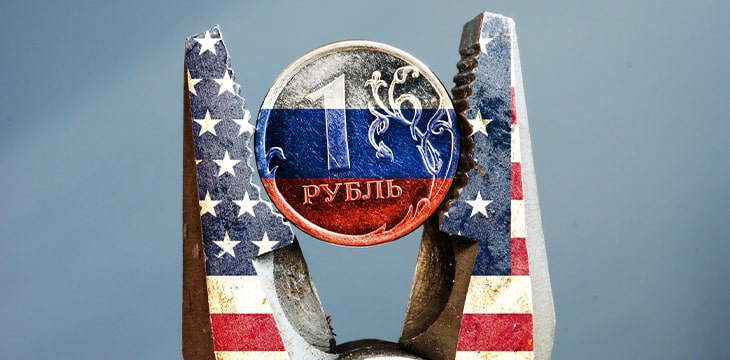|
Getting your Trinity Audio player ready...
|
Russia has entered into high-level discussions with its allies over a potential stablecoin platform to be used in cross-border settlements. State-owned media agency TASS said that the Ministry of Finance is spearheading the efforts to find alternative means of international payments after being slammed with a string of sanctions.
“With a number of countries, we are currently working to create platforms that are bilateral and not use dollars and euros,” said Deputy Finance Minister Alexey Moiseev. “We offer mutually acceptable tokenized instruments that will be used on these platforms, which are essentially clearing platforms that we are currently developing with countries.”
Moiseev made the revelation at the 7th Eastern Economic Forum held at Vladivostok. The lead topic of the symposium was “Towards a multipolar world” and had several speakers leaning towards the use of digital assets by the Russian State as a means of cross-border payments.
In his speech, Moiseev noted that the proposed stablecoins would be pegged to a recognizable instrument like gold that is transparent for all participating countries.
Early in the week, the country’s central bank and the Ministry of Finance agreed that, given the current geopolitical climate, it is nearly impossible for Russia to ignore the importance of virtual currencies for cross-border payments. Moiseev was quoted as saying that in the future, a law will be passed to legalize their usage but before then, a proper regulatory framework will be put in place to prevent misuse by money launderers and drug traffickers.
The events leading to Russia’s interest in digital assets
Russia’s position on digital currencies has been hostile in recent years, with a series of prohibitions on their use for local payments. Vladimir Putin, Russia’s President, crushed the hopes of enthusiasts in 2021 by saying BTC was unsuitable to be used as an international settlement for commodities like oil because of its inherent volatility.
In February, Russia invaded Ukraine after months of passive aggression, leading to the imposition of a series of sanctions by Western powers. Leading brands closed their operations in Russia, and things escalated after the country was kicked off the SWIFT network. Russia’s economy shrank by 10% amid reports that the country’s oligarchs and institutions were turning to digital assets to circumvent the sanctions.
Efforts have been made to explore a digital ruble as options run thin for administrators. Moiseev added that Russia will encourage local digital currency operators after identifying a trend of Russian citizens turning to foreign exchanges to trade.
Watch: The BSV Global Blockchain Convention panel, The Future of Digital Asset Exchanges & Investment

 03-01-2026
03-01-2026 




